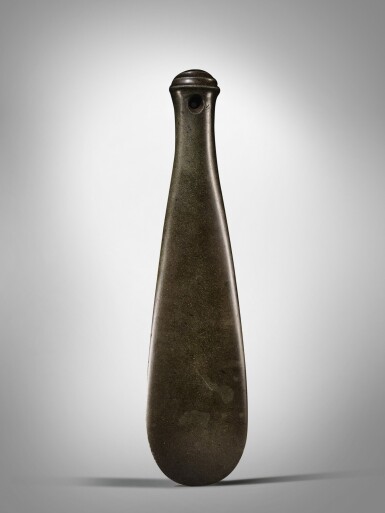
Property from the Estate of Valerie Franklin, Sold to Benefit the Hood Museum of Art
Maori Short Club, New Zealand
Lot Closed
May 18, 06:10 PM GMT
Estimate
3,000 - 5,000 USD
Lot Details
Description
Property from the Estate of Valerie Franklin, Sold to Benefit the Hood Museum of Art
Maori Short Club, New Zealand
Length: 14 1/4 in (36.2 cm)
Harry A. Franklin, Beverly Hills, acquired from the above by the late 1960s
Valerie Franklin, Los Angeles, by descent from the above
Los Angeles County Museum of Natural History, Art of the Pacific, 1971
Patu is a general term for club, whilst onewa refers to the greywacke or basalt from which the club is made. All varieties of patu are designed to deliver a one-handed jabbing stroke aimed at the lower edge of the ribs, the lower jaw, or the temple, the blow being struck with the distal end of the club.
The smooth and fine finish of this club was achieved after great labour; as Hooper notes, the creation of "the hole for a wrist cord was a particular technical challenge" (Steven Hooper, Pacific Encounters: Art and Divinity in Polynesia, 1760-1860, London, 2006, p. 140). These difficulties were sources of admiration when patu were first encountered by Europeans in the late 18th century; Adrienne Kaeppler notes that on Cook’s first voyage "basalt patu were greatly admired because of the work necessary to manufacture them with stone tools." (Kaeppler, Artificial Curiosities, Honolulu, 1978, p. 190). The form was so well-regarded by Joseph Banks that upon his return to London he commissioned forty brass replicas from the foundry of Eleanor Gyles, intending to take them as gifts on the second voyage (see Coote, "Joseph Banks’s Forty Brass Patus", Journal of Museum Ethnography, No. 20, March 2008, pp. 49-68).
